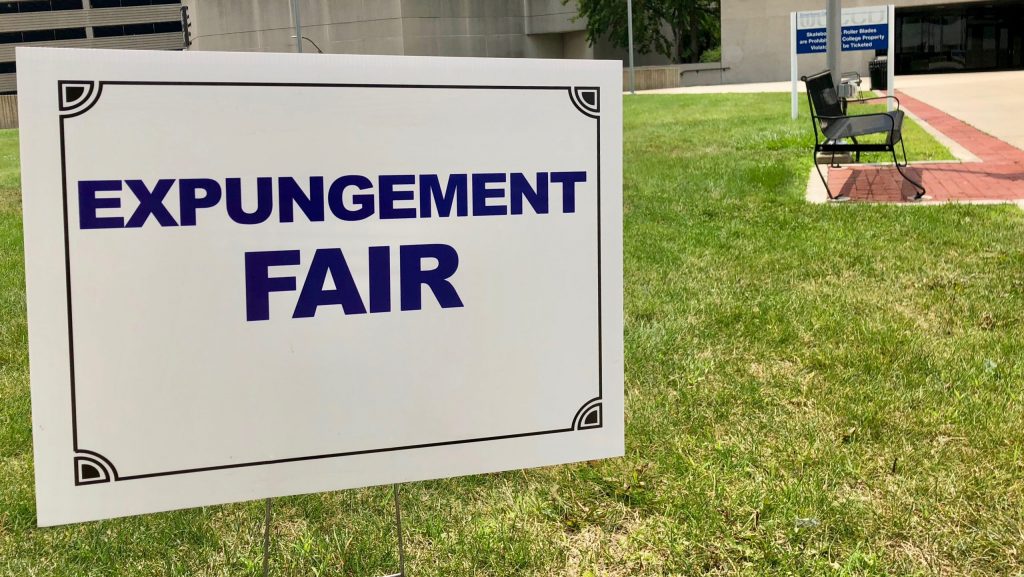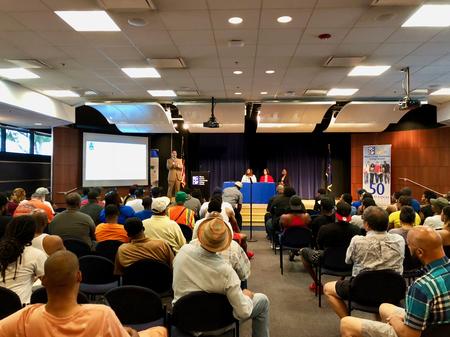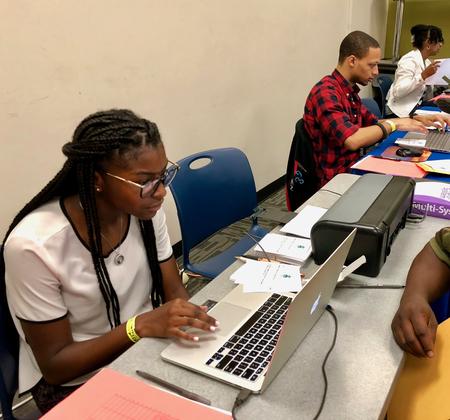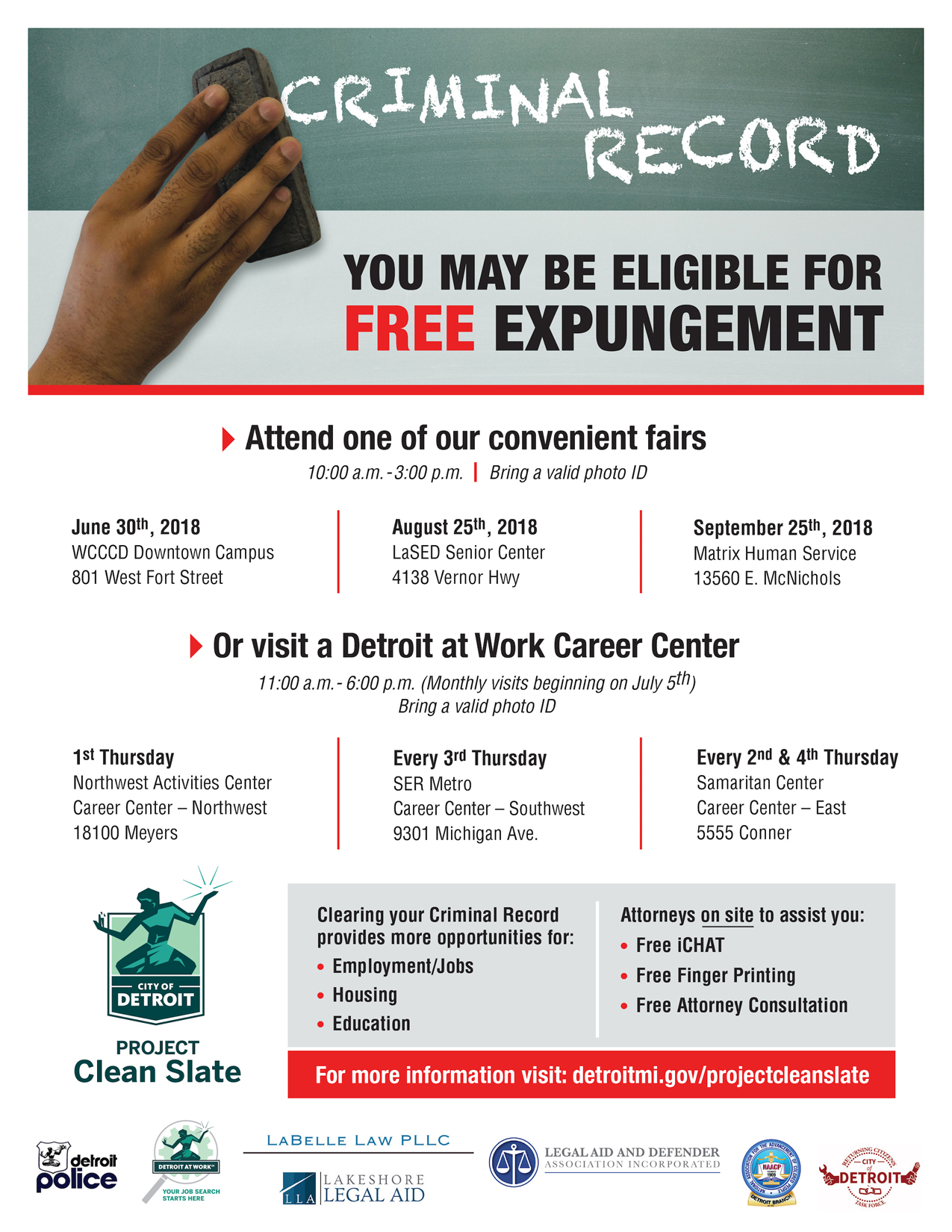Felony Forgiveness: Detroit Offers Clean Slate for Criminal Pasts
Project Clean Slate gives residents a clear record and a pathway to employment every week.

“In the real world, people are always going to look at a felony differently.”
Willie, a participant in Project Clean Slate
There’s a long line of people at Wayne County Community College in downtown Detroit. They’re waiting to register for Project Clean Slate, where they can get their criminal backgrounds removed from public record. Near the back is Willie, a 29-year-old Southwest Detroiter who just found out about the program.
“Yesterday I was getting off the bus and went to the transit center and they were sitting up there,” says Willie. “They were telling me about the program today, about how they can get an expungement off your name and everything.”
Willie asks WDET not to use his last name because he has multiple misdemeanors and felonies on his record and he’s trying to get them removed; it’s been hard to find a full-time job.
“There are people that don’t want to work with you because of your priors and it’s like, you don’t want that. You want to give people opportunities and make them feel better,” says Willie. “But in the real world, people are always going to look at a felony differently.”
Willie moves down the line, giving his ID to a volunteer who registers him. “Are you currently working?” she asks. “Through a temp agency,” Willie responds.

In the next room, Willie joins about a hundred other people as they listen to city coordinators explain how Project Clean Slate works. While the City of Detroit provides free legal work to get criminal records expunged, the program is limited by Michigan state law. Current statute allows for some, but not all, charges to be removed. The city can’t expunge any more than two misdemeanor charges, or any violent convictions or any traffic offenses like drunken driving. In all cases, the charges must have occurred in-state and are at least five-years-old.
“If you have multiple felonies, you’re probably not going to be eligible for any type of relief from the expungement program,” says the city coordinator.
Many people have questions about who and what qualifies. “I’m a resident of Grosse Pointe, but I’m a resident of Wayne County,” one person asks. “Can I still be here?”
“Sure,” says the city coordinator. “We want to help everybody.”
“Who do I go to, to talk about getting these two felonies off my record,” another person asks. “I don’t want to sit here wasting my time.” The man, and others, leave when they find out they don’t qualify.
Willie heads into the next room where a volunteer named Shelby Goodson uses a computer to pull up Willie’s past charges through the Internet Criminal History Access Tool – or ICHAT. It’s a service employers use to check the criminal backgrounds of potential hires, but anyone can use it.
“I’m just logging in and putting their information into the system, so we can print out an official document that displays any convictions they want to get expunged,” explains Goodson.

With his ICHAT record in hand, Willie heads down the hall to another room where dozens of lawyers are seated. He moves to an empty seat to speak with one who introduces himself. Dan Ericson is an attorney who is volunteering for Project Clean Slate by giving free legal advice.
It doesn’t make your criminal record go away,” says Ericson. “It just makes sure it’s not publicly available to employers and there’s a few other benefits as well.”
Over the next few minutes, Ericson reviews Willie’s ICHAT records. As it turns out, Willie had more convictions than he was aware of. Project Clean Slate does not apply to him and he can’t get any of his charges cleared.
“I’ve had a welfare fraud felony since 2001. That was the only thing in my life that I’ve ever done, and it affected my entire life.”
LaTonya, a participant in Project Clean Slate
After the fair, Willie meets up with a friend. Though he wasn’t able to benefit from the program, Willie says there are other people he knows that might be able to get some help from it. Even though he was not able to get any help today, Willie thinks one day the laws might change and he can come back to clear his record.
“It’s baby steps right now. You can’t just force something like yesterday,” says Willie. “You can’t change it like that. So right now, my goal is to keep focused on trying to get myself together and not worry about these priors getting off my name right now.”
Outside, a woman named LaTonya is waiting outside. Again, she asked WDET not to use her last name. LaTonya found about Project Clean Slate through a Facebook post her friend shared earlier in the week. She says she has just one charge on her record.
“I’ve had a welfare fraud felony since 2001. Having the felony caused me to lose my nursing license. I’ve been a nurse for over 25 years but I haven’t been practicing for the last 10 years because of that,” says LaTonya. “That was the only thing in my life that I’ve ever done, and it affected my entire life.”
Instead, LaTonya says she’s been doing menial work below her skill level. But she was able to go all the way through the Project Clean Slate procedure and is currently waiting to go before a judge and complete the rest of her expungement process. As for the next steps, LaTonya says she’s in school now to get her Physician’s Assistance license.
“The sky is the limit. There’s nothing stopping me anymore,” says LaTonya. “There’s nothing holding me back. Nothing at all. So as far as I want to go, I’m flying high.”

(Editor’s Note: Flyer information has been updated to reflect correct expungement fair schedule since the initial publishing of the story.)
